Unit19《Language》(Lesson 2)ppt-北师大版高二下PPT课件
北师大版教案Unit 19 Language Lesson 2 Varieties of English
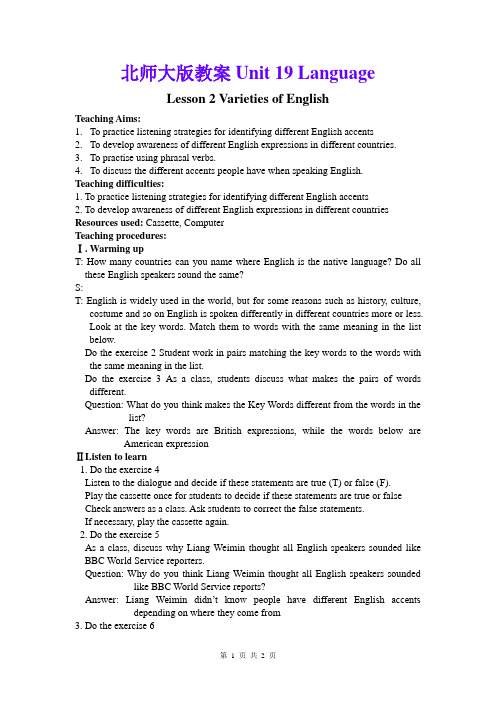
北师大版教案Unit 19 LanguageLesson 2 Varieties of EnglishTeaching Aims:1.To practice listening strategies for identifying different English accents2.To develop awareness of different English expressions in different countries.3.To practise using phrasal verbs.4.To discuss the different accents people have when speaking English.Teaching difficulties:1. To practice listening strategies for identifying different English accents2. To develop awareness of different English expressions in different countries Resources used: Cassette, ComputerTeaching procedures:Ⅰ. W arming upT: How many countries can you name where English is the native language? Do all these English speakers sound the same?S:T: English is widely used in the world, but for some reasons such as history, culture, costume and so on English is spoken differently in different countries more or less.Look at the key words. Match them to words with the same meaning in the list below.Do the exercise 2 Student work in pairs matching the key words to the words with the same meaning in the list.Do the exercise 3 As a class, students discuss what makes the pairs of words different.Question: What do you think makes the Key Words different from the words in the list?Answer: The key words are British expressions, while the words below are American expressionⅡListen to learn1. Do the exercise 4Listen to the dialogue and decide if these statements are true (T) or false (F).Play the cassette once for students to decide if these statements are true or false Check answers as a class. Ask students to correct the false statements.If necessary, play the cassette again.2. Do the exercise 5As a class, discuss why Liang Weimin thought all English speakers sounded like BBC World Service reporters.Question: Why do you think Liang Weimin thought all English speakers sounded like BBC World Service reports?Answer: Liang Weimin didn’t know people have different English accents depending on where they come from3. Do the exercise 6Ask students to read the strategies to the class in order to understand the listening skill.Play the cassette twice for students to listen and decide whether they are spoken in an American accent or a British accent .Check answers as a class by playing the cassette again, pausing after each sentence, and having students repeat the pronunciation which is the clue to the accent . Question: Can you identify a rule for the difference in the American and British pronunciation of the sound /a:/.Play the cassette twice to let students identify a rule for the difference in the American and British pronunciation of the sound /a:/.Answer: British pronunciation of the sound /a:/ but in American English is pronounced / æ/5.Do the exercise 7Play the cassette twice for students to listen and decide whether they are spoken in an Australian accent or a British accent.By playing the cassette check the answer and ask students to tell the reason, and pausing after each sentence. And having students repeat the pronunciation which is the clue to the accent.Question: Can you identify a rule for the difference in the Australian and British pronunciation of the sound /ei/Play the cassette twice to let students identify a rule for the difference in the Australian and British pronunciation of the sound /ei/Answer: British pronunciation of the sound /ei/ but Australian pronounces as /ai / 6.Do the exercise 8.Play the cassette once for students to listen and decide where the speakers come from.Play the cassette again and pause after each speaker for students to write down the words which have been pronounced differently with American, British or Australian accents.Check answer as a class and ask students to share rules they have noticed for the each country.ⅢListening1. Have individuals read out the listening strategies. Ask students if thesestrategies also apply when listening to Chinese.Do the exercise 9Listen to the Canadian travel dialogues. Use the Strategies to choose the correct alternative for each dialogue. There is one extra answer.Play the cassette twice for students to listen and answer the question2. When we speak English we must pay attention to expressing our idea indirectlyand politely and follow its custom and habit. Now let’s read through the Function File and see if they can match any of the expression with the gaps.Listen again and use these expressions to complete the Function File.3. Do the exercise 11Listen two or three times, pausing it for students to repeat the polite requestsⅣHomeworkWork in pairs. Student A and Student B turn to page 103。
高二英语北师大版选修7 Unit 19 language Writing PPT课件

高二英语北师大版选修7 Unit 19 language Writing PPT课件
In the end, if you come across some new words, don’t be afraid. Just refer to dictionary, where you can acquire the pronunciation and meanings. Or maybe you can just ask your Chinese friends, like me.
4.神 舟 7号 宇 宙 飞船 载着三 位航天 英雄胜 利返回 地球, 这艘宇 宙飞船 是我们 国家自 行研制 的,每 一个中 国人不 能不为 之骄傲 。 5.这 家 工 厂 虽 然规 模不大 ,但曾 两次荣 获省科 学大会 奖,三 次被授 予省优 质产品 称号, 产品远 销全国 各地和 东南亚 地区。
非谓语
You may meet some problems during learning. You can ask your Chinese friends. 非谓语: When meeting some problems during learning, you can ask your Chinese friends.
④听说能力:listening and speaking skills 3.多查字典,不会的地方及时
⑤查字典:refer to dictionary
中国朋友请教
Step 3: 语法准确,句型多变
5大类常见语法错误 1. I can speak English very good.
good-well, 副词修饰动词(注意词性)
北师大高中英语选修七配套课件:Unit 19 Language
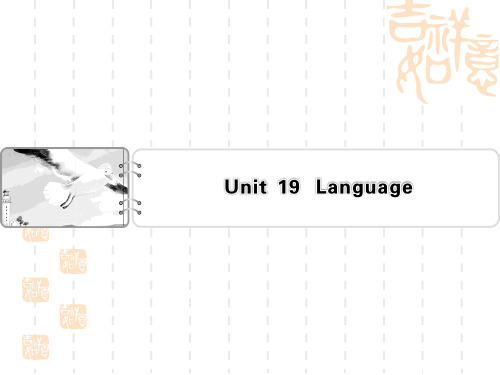
▪ 2.翻译佳句 ▪ 翻译画线句子。
▪ 【答案】事实上,一些概念被用来更好地区 别语言和方言之间不同的程度。
▪ 1.佳句仿写 ▪ ①我把她当作我最好的朋友。 ▪ ②他被认为是班里最聪明的学生。 ▪ ③这本书和那本书内容相似。 ▪ 【答案】①I refer to her as my best friend. ▪ ②He is considered to be/as the cleverest student
▪ According to encyclopedia,human languages are usually referred to as natural languages,
and the science of studying those falls under the linguistics (语言学).A common progress for
natural languages is that they are considered to be first spoken,then written,and then an
understanding and explanation of their grammar
is attempted.
▪ Languages live,die,move from place to place ,and change with time.Any language that ceases to change or develop is categorized as a dead language.In an opposite way,any language that is in a continuous state of change is known as a living language or modern language.
北师大版高一年级下册unit 19《language》lesson 2教学设计1(精品).doc

英语:Unit19《Language》Lesson 2 Varieties of English 教案(2)(北师大版选修7)Teaching objectives:1.To practise listening strategies f or identifying different English accents.2.To develop awareness of different English expressions in dif ferent countries.3. Identify situations and peopleTeaching difficulties: Identify situation s and peopleTeaching aids: ComputerTeaching Procedure:Step1Warm up1.Discussion:1)How many countries can you name where English is t he native language?2)Do all these speakers sound the same?2.Write down the words with the same meaning.1.mail_______2.movie______3.sidewalk_______4.trash _____5.Apartment_________Step2Listening1.Listen to the dialogue and decide if these sentences true (T) or false (F)[1.Pam is American. ( )2.Robert comes from Australia. ( )3.The more different accents you hear the more confused you get.( )4.Richard has an Australian English accent.( )5.Pam and Robert say “classroom” the same way.( )2.SummaryListening strategiesIdentifying different English accents★Before listening, think about different English accents.★While listening, pay attention to words that pronounced in different Englishaccents.★Listen to the intonation of the speakers to identify where they come from★Try to identify rules for accent of each country or place.Step3PracticeListen and decide whether they are spoken in an American accent (A) or British accent (B)1).Would you like a glass of water? ______2).She is dancing in the classroom.______3).Let’s give you an example._________4).I like to eat tomatoes._________2. Listen and decide whether they are spoken in an Australian accent (A) or British accent (B)1).Did you sa y you’re going sailing this weekend.___2).I’m going on a date this Sat urday._____3).How much did you pay for your rollerblades.____4).The mail always comes on Tuesday._____5). What did you say when he was late._____6). Sorry I’m late. I had to pay my bills. ______3. Listen and decide which speaker is American, which is British and which is Australian.AustralianStep4. Listening Strategies★Identifying situations and people★alternatives in the questions--what they are going to talk about.★the important words ---identify the situation.★sound effects --identify the situation.★anguage formal or informal--what the relationships are between the people★the intonation --their moodsStep5.PracticeListen to the Canadian travel dialogues. Use the Strategies to choose alternative for each dialouge.1.Where are the people?A)in a tourist information office B)in a hotelC)at the observation dome D)at t he travel agent’s2. Who is talking ?A)a tourist and a trainee B)a receptionist and a hotel guestC)a passenger and the Tour Managers D)two passengers3)What are they talking about?A)a tour around the city B)a delayC)stopping off some where D)the city’s buildings4)How do the tourists feel?A)nervous B)frustrated C) happy D)tiredStep6 Function File--Polite requests1._______to fill in this form here, please.2.I know this is unususl, but after the long flight _________to go on with the group.3.__________I just go off on my own a bit later?4._________she won’t be here till about ten o’clock.5._________having lunch in the hotel, sir?6.__________give me a map of the city, please?7.__________yo u could give me information about visiting some of the buildings in Toronto, please?8.____________have something about the modern buildings, please?9._______ask someone else,please?10.______I could ask you something?11._______to stay over an extra night in Winnipeg?12._______we have to keep to the timetable, sir.Step7.Activities--Act out a dialougestudentA—a tourist who is checking in a hotel ,make some requests at the front desk.StudentB—a receptionist of thehotel, refuse some of the requests politely。
高二英语(师大版) -选修七-Unit 19 Language(2)-2PPT

Observe
1. Some experts believe that to attain a high level of fluency and accuracy in a foreign language, you need to be surrounded by it.
Analyze and Identify
1. Some experts believe that to attain a high level of fluency and accuracy in a foreign language, you need to be surrounded by it.
What is your idea on how to learn a language well?
Student A: I think reciting new words every day is an important way to learn a foreign language.
Student B: I believe reading foreign language news websites every day is helpful.
Student A:
Some experts believe that to attain a high level of fluency and accuracy in a foreign language, you need to be surrounded by it.
北师大版高二下Unit19《Language》(Lesson 2)ppt课件

Match the key words with the same meaning in the list
Flat-------apartment Film-------movie Post-------mail Rubbish-----trash Pavement----sidewalk
British accent
Listen to the tape and do exercise 6, 7, and8
Keys to exercise 6 :1.B, 2.A, 3.A, 4.B, Keys to exercise 7: 1.Australian 2. British 3. British 4. Australian 5.British 6. Australian Keys to exercise 8: Jan---British Pattie----American Shane----Australian
Lesson 2 Varieties of English
Look at the following pictures and guess where are they. Tell me what language do they speak as their native/ first language. Do they have different accents?
Listening strategies: Identify the situation and people
1. look at the choices and guess what is going to be talked 2.catch the important words 3.pay attention to the sound effects 4.judge the formal or informal language 5.the intonation of the speaker
【教学设计】Unit 19 Lesson 2(北师大)
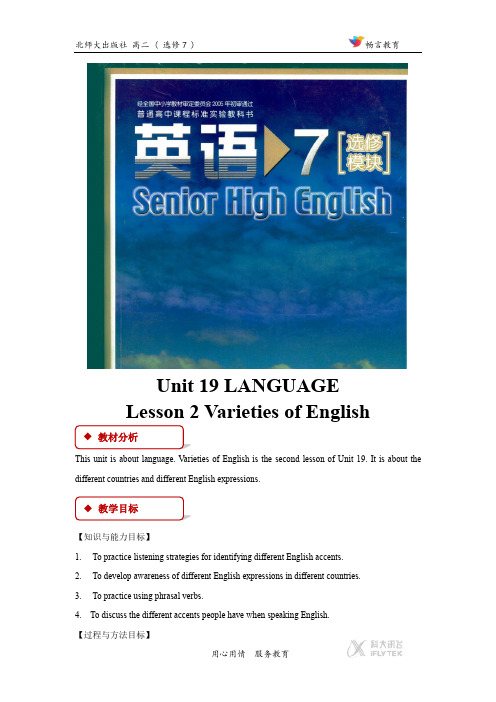
Unit 19 LANGUAGELesson 2 Varieties of EnglishThis unit is about language. Varieties of English is the second lesson of Unit 19. It is about the different countries and different English expressions.【知识与能力目标】1. To practice listening strategies for identifying different English accents.2. To develop awareness of different English expressions in different countries.3. To practice using phrasal verbs.4. To discuss the different accents people have when speaking English.【过程与方法目标】To train the students’ communicative ability by using the phrasal verbs.【情感态度价值观目标】To make the students the real masters in class and develop the students' awareness of self-learning.【教学重点】1. To identify different English accents.2. To grasp the usages of phrasal verbs.【教学难点】1.To practice listening strategies for identifying different English accents.2.To develop awareness of different English expressions in different countriesTape recorder, MultimediaStep1 Warm up1. Discussion:1) How many countries can you name where English is the native language?2) Do all these speakers sound the same?2. Write down the words with the same meaning.1. mail_______2. movie______3. sidewalk_______4. trash _____5. Apartment_________Step2Listening1. Listen to the dialogue and decide if these sentences true (T) or false (F)(1).Pam is American. ( )(2).Robert comes from Australia. ( )(3).The more different accents you hear the more confused you get.( )(4).Richard has an Australian English accent.( )(5).Pam and Robert say “classroom” the same way.( )2. SummaryListening strategies。
北师大版高一年级下册unit 19《language》lesson 2优秀教案4(重点资料).doc

Unit 19 CommunicationLesson 2 Varieties of EnglishObjectives[To practice listening strategies for identifying different English accentsTo develop awareness of different English expression in different countriesTo discuss the different accents people have when speaking EnglishPre-ListeningHave students name some countries where English is the native language. Then discuss if all these English speakers sound the same. Then show the pictures of some English speaking countries. They are: Australia, Britain, Canada, Ireland, New Zealand, South Africa, Jamaica and the United States.ListeningExercise 2Students work in pairs matching the Key Words to the words with the same meaning in the list.Check answers as a classExercise 3Students discuss what makes the pairs of words different as a whole class.Exercise 4Play the tape once for students then decide if these false statements are true or false.Check answers and correct the false statements.Exercise 5Discuss the question: Why do you think Liang Weimin thought all English speakers sounded like BBC World Service reporters? Exercise 6Learn the Listening Strategies with the class.Play the tape for students to decide whether the speakers are American or BritishPlay again and have students to repeat the sentences. Pay attention to the difference.Exercise7Play the tape for students to decide whether the speakers are Australian or BritishPlay again and have students to repeat the sentences. Pay attention to the difference.Exercise 8Listen to the conversation and decide which speaker is American,which is British and which is Australian.Check answers and ask students to share the rules they have found for the accent from different countries.Exercise 9Read the questions in exercise 9 and get ready for the listening Play the tape twice and then check the answers.Exercise 10First, read the Function File and try to fill the blanks.Play the tape to complete the gaps.Check the answers by playing the tape again.Discuss whether the expressions are polite or impolite, direct or indirect.Exercise 11[Listen and think about language and intonation. Decide which requests are polite and indirect, too direct and possibly rude. After-ListeningExercise 12Learn the Speaking Strategi es together.Work in pairs. Two students role play the situation.HomeworkRead the Culture Corner on page 16 to learn more about the English around the world.。
北师大版高一年级下册unit 19《language》lesson 2优秀教案3(重点资料).doc
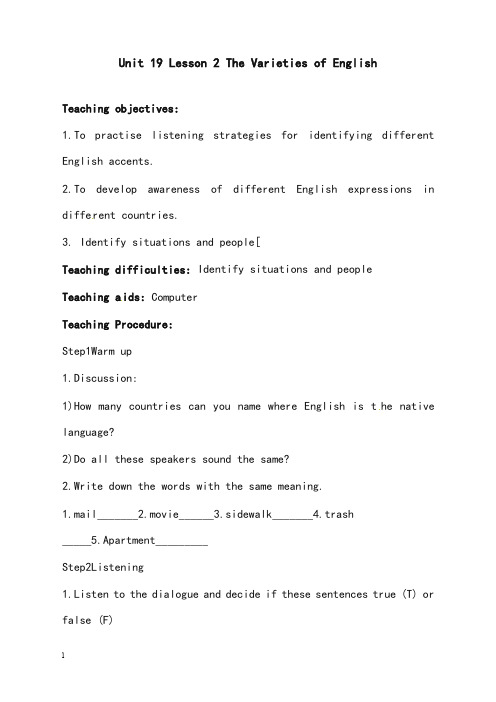
Unit 19 Lesson 2 The Varieties of EnglishTeaching objectives:1.To practise listening strategies for identifying different English accents.2.To develop awareness of different English expressions in different countries.3. Identify situations and people[Teaching difficulties: Identify situations and peopleTeaching aids: ComputerTeaching Procedure:Step1Warm up1.Discussion:1)How many countries can you name where English is t he native language?2)Do all these speakers sound the same?2.Write down the words with the same meaning.1.mail_______2.movie______3.sidewalk_______4.trash_____5.Apartment_________Step2Listening1.Listen to the dialogue and decide if these sentences true (T) or false (F)1.Pam is American. ( )2.Robert comes from Australia. ( )3.The more different accents you hear the more confused you get.( )4.Richard has an Australian English accent.( )5.Pam and Robert say “classroom” the same way.( )]2.SummaryListening strategiesIdentifying different English accents★Before listening, think about different English accents.★While listening, pay attention to words that pronounced in different English accents.★Listen to the intonation of the speakers to identify where they come from.★Try to identify rules for accent of each country or place. Step3Practice1.Listen and decide whether they are spoken in an American accent(A) or British accent (B)1).Would you like a glass of water? ______2).She is dancing in the classroom.______3).Let’s give you an example._________4).I like to eat tomatoes._________2. Listen and decide whether they are spoken in an Australian accent(A) or British accent (B)1).Did you say you’re going sailing this weekend.___2).I’m going on a date this Saturday._____3).How much did you pay for your rollerblades.____4).The mail always comes on Tuesday._____5). What did you say when he was late._____6). Sorry I’m late. I had to pay my bills. ______3. Listen and decide which speaker is American, which is British and which is Australian.BrtrishStep4. Listening Strategies★Identifying situations and people★alternatives in the questions--what they are going to talk about. ★the important words ---identify the situation.★sound effects --identify the situation.★anguage formal or informal--what the relationships are between the people★the intonation --their moodsStep5.PracticeListen to the Canadian travel dialogues. Use the Strategies to choose alternative for each dialouge.1.Where are the people?A)in a tourist information office B)in a hotelC)at the observation dome D)at the travel agent’s2. Who is talking ?A)a tourist and a trainee B)a receptionist and a hotel guestC)a passenger and the Tour Managers D)two passengers3)What are they talking about?A)a tour around the city B)a delayC)stopping off somewhere D)the city’s buildings4)How do the tourists feel?A)nervous B)frustrated C) happy D)tiredStep6 Function File--Polite requests1._______to fill in this form here,please.2.I know this is unususl, but after the long flight _________to go on with the group.3.__________I just go off on my own a bit later?4._________she won’t be here till about ten o’clock.5._________having lunch in the hotel,sir?6.__________give me a map of the city,please?7.__________you could give me information about visiting some of the buildings in Toronto,please?8.____________have something about the modern buildings,please?9._______ask someone else,please?10.______I could ask you something?11._______to stay over an extra night in Winnipeg?12._______we have to keep to the timetable,sir.Step7.Activities--Act out a dialougestudentA—a tourist who is checking in a hotel ,make some requests at the front desk.StudentB—a receptionist of thehotel, refuse some of the requests politely。
北师大版高一年级下册unit 19《language》lesson 2优秀教案1(重点资料).doc

英语:Unit19《Language》Lesson 2 Varieties of English 教案(2)(北师大版选修7)Teaching objectives:1.To practise listening strategies f or identifying different English accents.2.To develop awareness of different English expressions in different countries.3. Identify situations and peopleTeaching difficulties: Identify situations and peopleTeaching aids: ComputerTeaching Procedure:Step1Warm up1.Discussion:1)How many countries can you name where English is t he native language?2)Do all these speakers sound the same?2.Write down the words with the same meaning.1.mail_______2.movie______3.sidewalk_______4.trash _____5.Apartment_________Step2Listening1.Listen to the dialogue and decide if these sentences true (T) orfalse (F)[1.Pam is American. ( )2.Robert comes from Australia. ( )3.The more different accents you hear the more confused you get.( )4.Richard has an Australian English accent.( )5.Pam and Robert say “classroom” the same way.( )2.SummaryListening strategiesIdentifying different English accents★Before listening, think about different English accents.★While listening, pay attention to words that pronounced in different English accents.★Listen to the intonation of the speakers to identify where they come from★Try to identify rules for accent of each country or place. Step3PracticeListen and decide whether they are spoken in an American accent(A) or British accent (B)1).Would you like a glass of water? ______2).She is dancing in the classroom.______3).Let’s give you an example._________4).I like to eat tomatoes._________2. Listen and decide whether they are spoken in an Australian accent(A) or British accent (B)1).Did you say you’re going sailing this weekend.___2).I’m going on a date this Saturday._____3).How much did you pay for your rollerblades.____4).The mail always comes on Tuesday._____5). What did you say when he was late._____6). Sorry I’m late. I had to pay my bills. ______3. Listen and decide which speaker is American, which is British and which is Australian.AustralianStep4. Listening Strategies★Identifying situations and people★alternatives in the questions--what they are going to talk about. ★the important words ---identify the situation.★sound effects --identify the situation.★anguage formal or informal--what the relationships are between the people★the intonation --their moodsStep5.PracticeListen to the Canadian travel dialogues. Use the Strategies to choose alternative for each dialouge.1.Where are the people?A)in a tourist information office B)in a hotelC)at the observation dome D)at the travel agent’s2. Who is talking ?A)a tourist and a trainee B)a receptionist and a hotel guestC)a passenger and the Tour Managers D)two passengers3)What are they talking about?A)a tour around the city B)a delayC)stopping off somewhere D)the city’s buildings4)How do the tourists feel?A)nervous B)frustrated C) happy D)tiredStep6 Function File--Polite requests1._______to fill in this form here, please.2.I know this is unususl, but after the long flight _________to go on with the group.3.__________I just go off on my own a bit later?4._________she won’t be here till about ten o’clock.5._________having lunch in the hotel, sir?6.__________give me a map of the city, please?7.__________you could give me information about visiting some of the buildings in Toronto, please?8.____________have something about the modern buildings, please?9._______ask someone else,please?10.______I could ask you something?11._______to stay over an extra night in Winnipeg?12._______we have to keep to the timetable, sir.Step7.Activities--Act out a dialougestudentA—a tourist who is checking in a hotel ,make some requests at the front desk.StudentB—a receptionist of thehotel, refuse some of the requests politely。
Unit19Language-Lesson2课件5(北师大版选修7)
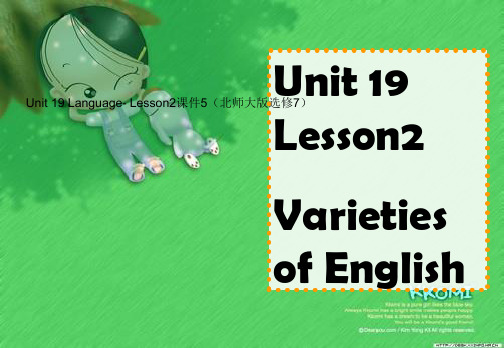
7. b) Help me with my bags, will you? 8. a) I was wondering if you could
help me with my bags.
gkstk精品课件
Now listen and repeat six polite requests. 1. Could you possibly give me a hand with my bags, please? 2. Is it all right if I leave my bags here? 3. I was wondering if I could have breakfast earlier?
3. a) If you’d like to wait a moment, please.
4. a) Could you just wait a moment, please?
5. a) Is it all right if I pay by credit cark. 6. b) I’ll pay by credit card.
5. WAuhsatrt adlidanyou say when he was late?
6. SBorrirtiyshI’m late. I had to pay my bills.
Australian
Hale Waihona Puke gkstk精品课件Listen to the conversation and decide which speaker is American, which is British and which is Australian.
Canada, the USA, Ireland, New Zealand, Australia, Britain. No, The English language has different varieties.
- 1、下载文档前请自行甄别文档内容的完整性,平台不提供额外的编辑、内容补充、找答案等附加服务。
- 2、"仅部分预览"的文档,不可在线预览部分如存在完整性等问题,可反馈申请退款(可完整预览的文档不适用该条件!)。
- 3、如文档侵犯您的权益,请联系客服反馈,我们会尽快为您处理(人工客服工作时间:9:00-18:30)。
1 Did you say you are going sailing this weekend? Australian
2 I am going on a date this Saturday! British 3 How much did you pay for your
rollerblades? British 4 The mail always comes on tralian 5 What did you say when he was late?British
5 Pam and Robert say “classroom” the same way.
F
Listen again and answer the following question (Exercise 5)
Why do you think Liang weimin thought all English speakers sounded like BBC World Service reporters?
Suggested answer He probably learns English by listening to BBC World Service broadcasting and has Never heard any others English accent.
Exercise 6
Listen to the sentences and decide whether they are
A
• 4 I like to eat tomatoes.
B
Can you identify a ran and British pronunciation of the sound 〔a:〕.
Exercise 7
Now listen to these sentences and decide whether they are spoken in an Australian accent or a British accent.
To discuss the different accents people have when speaking English
Pre-Listening
How many countries can you name where English is the native language? Do all these English speakers sound the same?
6 Sorry I am late. I had to pay my bills.
Australian
Can you identify a rule for the difference in the Australian and British pronunciation of
the sound 〔ei〕.
Show the English speaking countries
Britain
The United States
Australia
New Zealand
Canada
Ireland
South Africa
Jamaica
Look at the key words. Match them to words with the same
Discussion (Exercise 3)
What do you think makes the Key Words different from the
words in the list?
Listening
Listen to the dialogue and decide if these
statements are true (T) or false (F).
Exercise 4
1 Pam is America.
T
2 Robert comes from Australia. F
3 The more different accents you hear the more
confused you get. F 4 Richard has an Australian English accent.’ T
spoken in an American accent (A) or a British accent (B)
• 1 Would you like a glass of water? B
• 2 She’s dancing in the classroom. A
• 3 Let me give you an example.
meaning in the list below. (Exercise 2)
Flat, film, post, rubbish, pavement, subway 1 mail post 2 movie film 3 sidewalk pavement 4 trash rubbish 5 apartment Flat 6 underground subway
Unit 19 Communication
Lesson 2 Varieties of English
Objectives
To practice listening strategies for identifying different English accents.
To develop awareness of different English expression in different countries.
Listen to the conversation and decide which speaker is American, which is
British and which is Australian.
(Exercise 8)
American Australian British
Jan
★
Pattie
